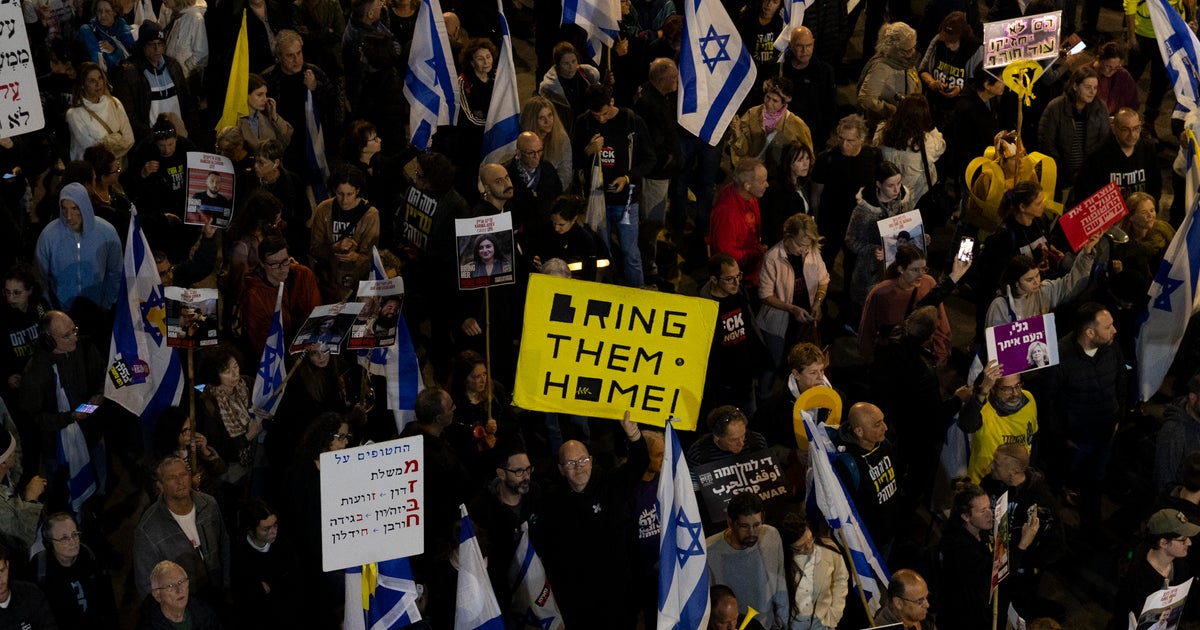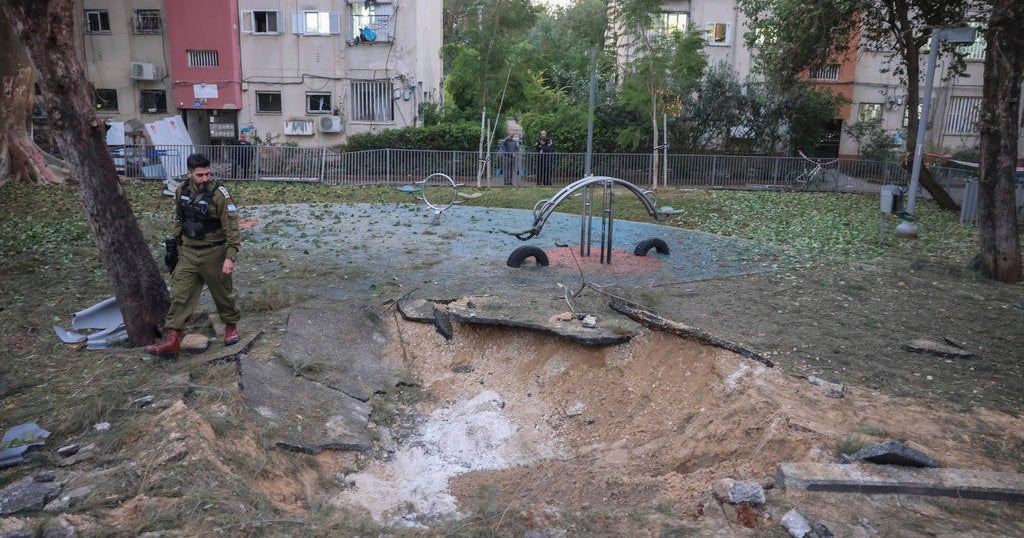Thousands in Gaza flee heavy Israeli fire as death toll mounts from conflict: "It was a massacre"
Thousands of Palestinians grabbed children and belongings and fled their homes Friday as Israel barraged the northern Gaza Strip with tank fire and airstrikes. Residents said a family of six was killed in their home overnight in what Israeli officials said was an operation to clear militant tunnels.
As international efforts at a cease-fire stepped up, Israel appeared to be looking to inflict intensified damage on the Islamic militant group Hamas, which controls the Gaza Strip and has fired hundreds of rockets into Israel.
"The kids are all afraid," a Palestinian woman said. "Even us adults who have been in war since our childhood are afraid. We cannot bear this anymore."
The Gaza violence increasingly spilled over into turmoil elsewhere.
Across the West Bank, Palestinians held their most widespread protests since 2017, with hundreds in at least nine towns burning tires and throwing stones at Israeli troops. Soldiers opening fire killed six, according to Palestinian health officials, while a seventh Palestinian was killed as he tried to stab an Israeli soldier.
Within Israel, communal violence erupted for a fourth night. Jewish and Arab mobs clashed in the flashpoint town of Lod, even after additional security forces were deployed.
In Gaza, the toll from the fighting rose to 122 killed, including 31 children and 20 women, with 900 wounded, according to the Health Ministry. The Hamas and Islamic Jihad militant groups have confirmed 20 deaths in their ranks, though Israel says that number is much higher. Eight people have been killed in Israel, including a 6-year-old boy and a soldier.
Israel's relentless campaign was clouded with confusion after a military spokesperson told the international media on Thursday that its soldiers were "on the ground" in Gaza then later saying they weren't, CBS News foreign correspondent Imtiaz Tyab reports. The Israeli media says the apparent miscommunication could have been part of a deliberate ploy to confuse Hamas.
But it didn't slow Hamas' campaign of rocket fire; at least 1,800 have been fired at Israel since the conflict began, Tyab reports.
Israel called up 9,000 reservists Thursday to join its troops massed at the Gaza border. Before dawn Friday, Israeli tanks deployed on the border and warplanes carried out an intense barrage on the northern end of the Gaza Strip.
Houda Ouda said she and her extended family ran frantically into their home in the town of Beit Hanoun, seeking safety as the earth shook for two and half hours in the darkness.
"We even did not dare to look from the window to know what is being hit," she said. When daylight came, she saw the swath of destruction: streets cratered, buildings crushed or with facades blown off, an olive tree burned bare, dust covering everything.
Rafat Tanani, his pregnant wife and four children, aged 7 and under, were killed after an Israeli warplane reduced their four-story apartment building to rubble in the neighboring town of Beit Lahia, residents said. Four strikes hit the building at 11 p.m., just before the family went to sleep, Rafat's brother Fadi said. The building's owner and his wife also were killed.
"It was a massacre," said Sadallah Tanani, another relative. "My feelings are indescribable."
Lieutenant Colonel Jonathan Conricus, an Israeli military spokesman, said the operation involved tank fire and airstrikes, aimed at destroying a tunnel network beneath Gaza City that the military refers to as "the Metro," used by militants to evade surveillance and airstrikes.
"As always, the aim is to strike military targets and to minimize collateral damage and civilian casualties," he said. "Unlike our very elaborate efforts to clear civilian areas before we strike high-rise or large buildings inside Gaza, that wasn't feasible this time."
When the sun rose, residents streamed out of the area in pickup trucks, on donkeys and on foot, taking pillows, blankets, pots and pans and bread. "We were terrified for our children, who were screaming and shaking," said Hedaia Maarouf, who fled with her extended family of 19 people, including 13 children.
Adnan Abu Hasna, a spokesman for the U.N. Relief and Works Agency for Palestine Refugees known as UNRWA, said thousands broke into 16 schools run by the agency, which he said was scrambling to find a way to shelter them, given movement restrictions on its staff amid the fighting and COVID-19 worries.
Mohammed Ghabayen, who took refuge in a school with his family, said his children had eaten nothing since the day before, and they had no mattresses to sleep on. "And this is in the shadow of the coronavirus crisis," he said. "We don't know whether to take precautions for the coronavirus or the rockets or what to do exactly."
Hamas showed no signs of backing down. Some of its rockets targeted the seaside metropolis of Tel Aviv, although more than a quarter of them have fallen short inside Gaza and most of the rest have been intercepted by missile defense systems.
Still, the rockets have brought life in parts of southern Israel to a standstill and caused disruptions at airports.
A spokesman for Hamas' military wing said the group was not afraid of a ground invasion, which would be a chance "to increase our catch" of Israeli soldiers.
The strikes came after Egyptian mediators rushed to Israel for cease-fire talks that showed no signs of progress. Egypt, Qatar and the U.N. were leading truce efforts.
The U.S. and other nations agreed to hold an emergency open virtual meeting of the U.N. Security Council on Sunday, CBS News' Pamela Falk reports.
Prime Minister Benjamin Netanyahu vowed Hamas would "pay a very heavy price" for its rocket attacks.
In the U.S., President Biden said he spoke with Netanyahu about calming the fighting but also backed the Israeli leader by saying "there has not been a significant overreaction."
He said the goal now is to "get to a point where there is a significant reduction in attacks, particularly rocket attacks." He called the effort "a work in progress."




